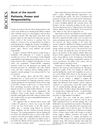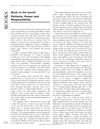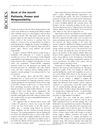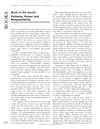
The conclusion is that endocrinology significantly impacts medicine with various common medications used for treatment.
 January 2017 in “Elsevier eBooks”
January 2017 in “Elsevier eBooks” Stress and hormones like progesterone can affect absence seizures, but their effects change with different life stages.
 April 2016 in “Plastic and reconstructive surgery. Global open”
April 2016 in “Plastic and reconstructive surgery. Global open” The supplement highlighted advancements and challenges in plastic and reconstructive surgery, including the impact of smoking, chemotherapy, and new treatments like Tafluprost for hair loss.
 January 2016 in “Springer eBooks”
January 2016 in “Springer eBooks” New materials and methods could improve skin healing and reduce scarring.
 November 2015 in “European Journal of Inflammation”
November 2015 in “European Journal of Inflammation” Cicatricial alopecia, a permanent hair loss condition, is mainly caused by damage to specific hair follicle stem cells and abnormal immune responses, with gene regulator PPAR-y and lipid metabolism disorders playing significant roles.
 August 2015 in “MOJ proteomics & bioinformatics”
August 2015 in “MOJ proteomics & bioinformatics” ePUKs could be valuable for regenerative medicine due to their wound healing abilities.
 March 2015 in “Plastic and reconstructive surgery”
March 2015 in “Plastic and reconstructive surgery” Human skin has multiple layers and functions, with key roles in protection, temperature control, and appearance.
 November 2014 in “John Wiley & Sons, Ltd eBooks”
November 2014 in “John Wiley & Sons, Ltd eBooks” Eating high-glycemic and dairy foods can increase hormones that may cause acne and other health issues.
 September 2014 in “Aktuelle Dermatologie”
September 2014 in “Aktuelle Dermatologie” The symposium concluded that environmental factors significantly contribute to skin aging.

Chemicals and stem cells combined have advanced regenerative medicine with few safety concerns, focusing on improving techniques and treatment effectiveness.

Keratin hydrogels from human hair show promise for tissue engineering and regenerative medicine.
 February 2012 in “InTech eBooks”
February 2012 in “InTech eBooks” PCOS increases the risk of heart disease and type 2 diabetes in women.
 January 2012 in “Elsevier eBooks”
January 2012 in “Elsevier eBooks” New treatments for skin and hair repair show promise, but further improvements are needed.

Type II spiral ganglion neurites avoid high concentrations of laminin and fibronectin.
 July 2008 in “Biomedical Imaging and Intervention Journal”
July 2008 in “Biomedical Imaging and Intervention Journal” New cancer treatments are more precise and less toxic, improving survival rates, but Asia faces challenges in adopting these advancements.
 June 2008 in “British Journal of Dermatology”
June 2008 in “British Journal of Dermatology” UK medical students lack dermatology education, liver biopsy patients with risk factors show more fibrosis, and certain fungi resist drugs due to melanin; genetics may influence female hair loss.
 October 2007 in “Journal of Investigative Dermatology”
October 2007 in “Journal of Investigative Dermatology” The meeting highlighted the genetic basis of female pattern hair loss and various skin health insights.

The vitamin D receptor has many roles in the body beyond managing calcium, affecting the immune system, hair growth, muscles, fat, bone marrow, and cancer cells.
 September 2004 in “Experimental dermatology”
September 2004 in “Experimental dermatology” Melatonin directly affects mouse hair follicles and may influence hair growth.
 October 2003 in “Journal of Investigative Dermatology Symposium Proceedings”
October 2003 in “Journal of Investigative Dermatology Symposium Proceedings” Mice treatments didn't grow hair, a patient treatment may affect immune response, and people with hair loss often feel anxious or depressed.
 September 2003 in “Journal of the Royal Society of Medicine”
September 2003 in “Journal of the Royal Society of Medicine” The book has valuable information but is hard to read due to poor writing.
 September 2003 in “Journal of the Royal Society of Medicine”
September 2003 in “Journal of the Royal Society of Medicine” The book is a comprehensive guide for forensic practitioners and exam candidates.
 September 2003 in “Journal of the Royal Society of Medicine”
September 2003 in “Journal of the Royal Society of Medicine” Doctors should set boundaries and seek outside help for family medical issues.
 September 2003 in “Journal of the Royal Society of Medicine”
September 2003 in “Journal of the Royal Society of Medicine” The book is a useful reference for forensic medicine with some areas needing expansion for multicultural relevance.
 September 2003 in “Journal of the Royal Society of Medicine”
September 2003 in “Journal of the Royal Society of Medicine” The document concludes that while some advocate for a patient voucher system, it may be unequal and current healthcare reforms should be given a chance, and it also recommends various medical books for their comprehensive coverage and advice on specific health issues.
 September 2003 in “Journal of the Royal Society of Medicine”
September 2003 in “Journal of the Royal Society of Medicine” Improving end-of-life care at home requires better coordination, communication, and support.
 September 2003 in “Journal of the Royal Society of Medicine”
September 2003 in “Journal of the Royal Society of Medicine” Understanding breast cancer requires considering both medical advancements and social influences.
 January 2003 in “Elsevier eBooks”
January 2003 in “Elsevier eBooks” Androgens and other hormones affect hair growth and skin conditions like acne.

Integrin alphavbeta6 is important for wound healing and hair growth, and blocking it may improve these processes.
 June 2023 in “Italian Journal of Medicine”
June 2023 in “Italian Journal of Medicine” Urotensin II increases growth and VEGF production in rat skin cells by turning on the Wnt-β-catenin pathway.






























